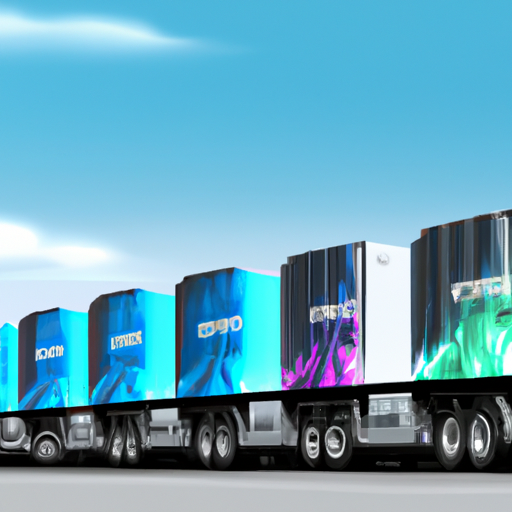A recent competition called the Clean Energy Hydrogen Hubs has named zero-emission fuel cell trucks as the big winners. The competition, part of a $7 billion Energy Department program, aims to increase hydrogen (H2) production in the United States. Currently, a significant portion of hydrogen produced in the US comes from natural gas, but the goal is to reduce the cost of alternative sources. While this may pose a challenge for gas stakeholders, ExxonMobil has a plan to adapt.
The Rise of Fuel Cell Trucks
The Clean Energy Hydrogen Hubs competition, which began in September 2022, seeks to leverage renewable energy and regional resources to reduce costs and decarbonize industries that are difficult to transition. One of these industries is long-haul trucking. While battery-powered electric trucks have become popular, some stakeholders in the trucking industry prefer a faster solution than recharging batteries. Additionally, there are concerns about the infrastructure needed to support a large-scale switch to battery-powered trucks. As a result, attention has turned to hydrogen fuel cell electric trucks. These trucks can refuel with hydrogen in a similar amount of time to pumping diesel and do not rely on grid electricity. Furthermore, fuel cells can provide a longer range while being lighter and taking up less space compared to battery packs in Class 8 trucks.
The Winning Hydrogen Hubs
The Energy Department has selected two hotspots, California and Texas, as locations for winning Hydrogen Hub projects. The California project, called ARCHES, will focus exclusively on biomass sources and green hydrogen produced through electrolysis powered by renewable energy. This project will enable fuel cell truck stakeholders in California to promote zero-emission transportation without relying on natural gas. Another winning project, PNW, will benefit sustainability-minded stakeholders along the Pacific coast transportation corridor, connecting Washington, Oregon, and Montana. This project will focus on water electrolysis, with Montana utilizing its potential for wind energy.
Additionally, the MachH2 project will cover Illinois, Indiana, and Michigan, focusing on transportation fuels and other industries. The Energy Department explains that the Midwest Hydrogen Hub will enable decarbonization in various sectors, including heavy-duty transportation and power generation. While the project includes both natural gas and green hydrogen, it will make strides in reducing carbon emissions. The HyVelocity project in Texas will also utilize both electrolysis and natural gas for its Hydrogen Hub proposal.
Pushing Green Hydrogen and Fuel Cell Technology
The Energy Department’s SuperTruck 3 initiative has gained momentum among legacy stakeholders, including Bosch, Ford, GM, and Daimler North America. One notable player in the fuel cell truck field is the startup Nikola, which has focused on green hydrogen since its launch in 2014. Nikola plans to build hydrogen fuel stations, including a mobile fuel station, in California and other locations to support its trucks. Partnership announcements from companies like Bosch, the US Postal Service, and Plug Power show the increasing interest in Nikola’s plans for green hydrogen fueling. Plug Power aims to bring its electrolyzer technology to Texas.
An additional player in Texas is Hyzon, which recently tested a liquid hydrogen version of its fuel truck on Texas roadways. The German truck maker Quantron is also entering the US market with its fuel cell trucks. This company has partnered with Ballard Power Systems, a Canadian firm with a strong presence in the fuel cell mobility industry. Quantron plans to introduce its hydrogen fuel-as-a-service model in the US, leveraging green hydrogen supplied by New Day.
ExxonMobil’s Adaptation and Republican Leadership in Congress
ExxonMobil, in response to the rise of green hydrogen, has announced a significant investment to expand its shale gas footprint in the low-cost fields of the Permian Basin. This move positions ExxonMobil to participate in the Hydrogen Hubs program but also puts it in direct competition with the growing green hydrogen industry. Despite the challenges, ExxonMobil has its petrochemical business to fall back on. Meanwhile, the lack of Republican leadership in Congress hampers progress in decarbonizing the trucking industry and other sectors. Republican representatives have obstructed important business, reminiscent of their previous attempts to overturn the 2020 elections. This behavior, influenced by former President Donald Trump, has delayed military promotions and key State Department appointments.
Overall, the Clean Energy Hydrogen Hubs competition promises to accelerate the adoption of zero-emission fuel cell trucks and promote the production of green hydrogen across the US. With the participation of big players in the industry and the development of innovative projects, the future of decarbonized long-haul trucking looks promising.
